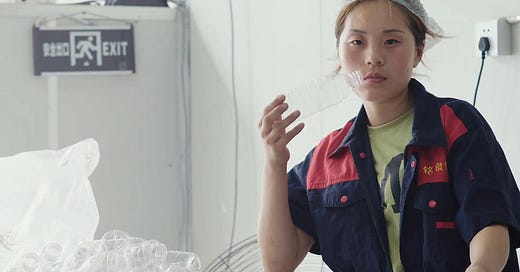Ascension
The Oscar-nominated documentary is a disturbing and revealing look at economic change rapidly spreading across China.
It’s one thing to hear about Chinese factories where workers toil for hours, often in unhealthy conditions, making goods for Westerners. It’s quite another to see it in action in “Ascension,” the documentary up for an Academy Award that takes you inside the productive engine of what will soon be the world’s largest economy.
We see Chinese worker drones toiling over making pens, dolls, carpets, electronics, Christmas trees and pretty much every other consumer good you can think of. Stop reading a moment and look around your house, office or wherever you are right now: it’s likely a good chunk of the stuff you see rolled off one of these assembly lines.
My biggest shock in the movie was the sequence of workers laboring intently over creating extremely life-like human figures, right down to carefully selected eye color and makeup. It’s only when you see the huge breasts you realize these are sex dolls, created and sent to America or other places for their… uses.
The workers measure the areolas carefully to meet customer specifications, and argue about which shade to paint them. It’s amusing, then creepy, then sad.
We also see things like the large outdoor recruiting squares where these companies find their workers, which operate not terribly unlike cattle calls. They brag about offering $2.39 an hour, or providing air-conditioned dorms where only four people sleep to a room. OK, maybe six. No more than eight, the droning announcer pledges.
Director Jessica Kingdon takes us to dozens of locations just like this in the film’s 97 minutes, but it doesn’t stop there. The observational documentary also takes us further up the socioeconomic ladder, showing how technological changes are reshaping China’s economy, even as the culture holds more stubbornly fast to its ways.
We meet young, fit men training to be personal bodyguards, as the instructor berates them and makes them pummel each other in the shoulders until they resemble the color of eggplants. Workers carefully gutting tons of duck carcasses, assembling binoculars, and so on.
The movie is presented without narration or titles, and the only dialogue is that spoken by the people we’re observing. The photography (by Kingdon and Nathan Truesdell) is often breathtaking, turning the mundane into abstract art — like an overhead shot of a veritable sea of yellow bicycles, waiting to be loaded and shipped off.
Later, we’ll see more upscale Chinese who are clearly keen on imitating their Western counterparts. There are social media influencers, and even a class on how to become one. They each receive their diploma after two whole days of coursework, complete with their stated goals. The conservative ones say they want to make $5 million within five years, the stretchers go for $700 million.
It’s a sobering reflecting of our own digitized society and its twisted values, where it’s not about the worth of what you do but how many eyeballs you can attract while doing it.
“Knowledge isn’t worth anything. Knowledge must be monetized,” the influencer teacher says.
In another class for rising managers, the mostly female students are taught how to smile (show exactly eight teeth, only the top row), the best way to wave and hugging protocols. Chinese people generally don’t like to be touched, they are taught, but many foreigners expect it.
We also meet some people training to be butlers, who are warned that accepting abuse and having no personal life is part of the job. And then we observe some well-to-do yuppies who are the sort who would want such services.
The nouveau riche meets the nouveau servant class — who are still happy they’re not stuck in one of the sex doll factories.
Kingdon herself is very much a product of the newer privileged class of Chinese, the daughter of American hedge fund manager Mark E. Kingdon and financier Anla Cheng, who sits on the Committee of 100, a powerful group of business influencers who seek better relations between China and America. I don’t think her film will be celebrated much among committee members.
The portrait we see of modern China is oddly inspiring and chilling. You can’t help but be impressed by the industry and work ethic of these people. But it’s also scary how they are taught new skills and are making fancier stuff, but the proletariat mindset still remains very much the same.
For example: employees are gathered for large exercises or militaristic parades where they sing the company’s praises and promise to always be loyal. They also fawn over company executives, not unlike the worship of figures like Steve Jobs, but live in a world where they can be docked wages at the whims of the managers, whom the employees line up to bribe for favors.
Gosh knows American capitalism doesn’t always produce the most equitable results. (Hint: that’s a feature, not a bug.) But seeing this broad diaspora of economic development can feel both uplifting and intimidating.
Like it or not, China is what the U.S. was before World War II: a sleeping giant whose footfalls will reverberate across the globe.
“Ascension” is currently available to rent on Paramount Plus (including its partnership with Amazon) and Eventive.





